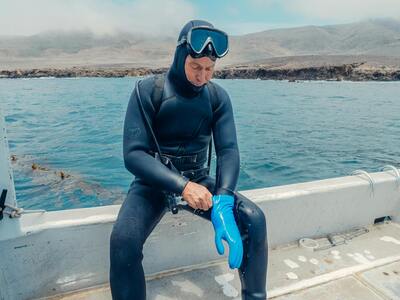Thoughts of boat diving bring to mind the feeling of the sun on your skin and the boat’s gentle movement. They also bring the anticipation of exploring incredible underwater worlds.
It’s certainly an adventure that combines the thrill of exploration with the serenity of the ocean depths. But like any activity that takes you out of your familiar environment, you must approach boat diving with safety in mind.
For a perfect and safe dive, there are simple practices you must follow. What are they? We’ll share them here.
1 Get Your Gear in Check

You wouldn’t jump out of an airplane without checking your parachute first, right? Same deal with diving. Your dive gear is, quite literally, your lifeline underwater. So, do a thorough pre-dive check.
Inspect your equipment before you leave the dock. Test your regulator and dive computer before you board the boat
Make sure you also check the buoyancy control device (BCD). It’s basically a piece of scuba equipment that helps divers control depth and inflates to help them return to the surface. Check if the low-pressure inflator hose is securely connected and if the inflate and deflate buttons operate smoothly without sticking. You must also test all the dump valves to confirm they open and close correctly.
Make sure there is enough air in your tank. Fully open the cylinder valve and verify the pressure gauge reading. Loose hoses, ill-fitting masks, or a weight belt that is not snug, could cause major headaches once you’re underwater. Secure them before diving.
2 Buddy Up and Stick Together
Always dive with a buddy. If you run low on air or face an equipment malfunction, your buddy will be there to help. Two sets of eyes are invariably better than one. Your buddy can help you spot potential hazards and navigate unfamiliar dive sites. Beyond emergencies, a buddy can provide practical assistance, both underwater and in the boat
A case in point was Chicago’s Playpen boating accident. A woman lost both legs when a rented yacht drifted into a flat boat due to a malfunctioning anchor. She later credited her husband for pulling her from the water just in time.
Victims of such accidents may be eligible for compensation. In cases involving mechanical failures, the rental company can be held liable. No doubt, legal battles are complex. Only the best personal injury lawyer in Chicago can help recover fair compensation for the injuries sustained. According to TorHoerman Law, a dedicated personal injury attorney can help victims rebuild their lives. They fight for their rights and make sure they receive the compensation they deserve.
3 Don’t Skip the Dive Briefing
Yes, we get it. You just want to gear up and get in the water. But the dive briefing is where you get important details that can significantly impact your safety and your dive’s quality. Don’t skip it at any cost; the tips and tricks the dive instructor shares will help you enjoy the ride
You will receive detailed dive site information, including the name of the site and a description of the underwater topography. This will help you visualize the dive and plan your approach. Pay attention to entry and exit points. This helps prevent injuries and ensure a smooth process, especially in variable sea conditions.
The dive briefing will also cover emergency procedures. This includes what to do if you are separated from your buddy or how to signal for help if you experience a problem like running low on air.
4 Be Mindful of Boat Traffic
You’ve surfaced from your dive – great. But the surface of the ocean, particularly around popular dive sites, can be a bustling environment with various types of boats. Boat traffic can pose a significant hazard if you’re not careful. Collisions between boats and divers can lead to serious injuries, including those from propellers.
Use a diver-down flag; it will alert boaters that you are below, so they can exercise caution and maintain a safe distance. If you’re diving in an area with heavy boat traffic, use a surface marker buoy. It will make your location much more apparent to boats on the surface. Boats don’t always follow the rules, and not every captain is watching for divers. Always ascend slowly and listen carefully for the sound of boat engines.
Diving is one of the most incredible experiences out there. But it’s not without risks, especially when you’re diving from a boat. Follow these safety rules and you will have an amazing and safe time under the water.